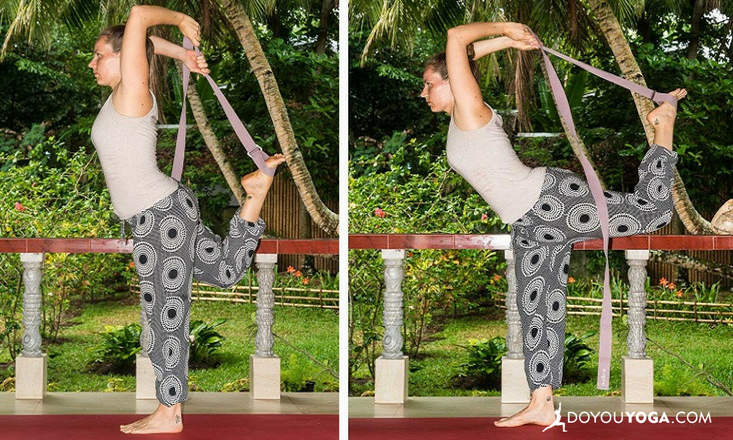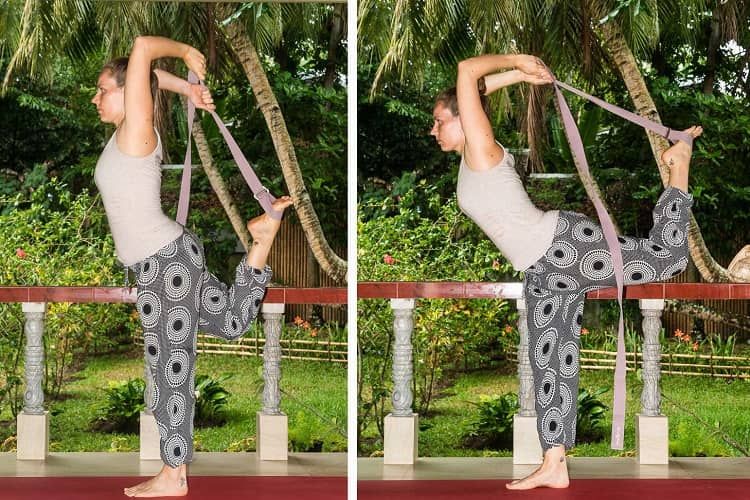I’ve always connected to Lord of the Dance pose (Natarajasana in Sanskrit) because I was a dancer myself growing up. I remember in one of my first yoga classes, my teacher cued for Dancer’s pose, and I thought to myself, oh I’ve got to be able to do this one!
What I like about Natarajasana is what I love about dance—it’s expressive. On the outside, you have a beautiful, heart-opening backbend that tests the limits of your hamstring flexibility, increases energy, and teaches you concentration and grace. On the inside, the posture cultivates feelings of strength and power as you stand strong and balanced.
In preparation for Natarajasana, you’ll need to open your shoulders, hamstrings, and back. Your quads, hip flexors, and hamstrings need to be stretched out. Natarajasana also requires stability and balance, so you’ll want to practice poses that help you establish your foundation and grounding. On top of all that, you’ll need some heat in your body to avoid injury because Natarajasana is an advanced pose.
After a thorough warm-up, here are a few great prep poses for natarajasana: anjaneyasana (Low Lunge), the Warrior poses (I, II, and III), Camel, Half Bow pose, Pigeon, and King Pigeon pose.
1. Tadasana and Arm Prep
Start in a strong Tadasana (Mountain Pose) to set a solid foundation before going anywhere. Focus on lifting up on your knee caps by engaging and lengthening your quad muscles while rooting down through your feet.
Keeping the palms facing forward, rotate your shoulders outwards, and press your shoulder blades down into your back pockets. Then, take your left elbow to your hip with your palm facing up.
2. Quad Stretch and Hand Position
Bend your left knee and reach back to grab the inside of your foot. For an extra charge-up, press your thumb into the soft spot just beneath the ball of your foot. This is the solar plexus reflex point on your foot. The solar plexus chakra churns energy towards confidence, personal morale, and spirit.
3. Kick Foot Into Hand
Press and kick your foot into your hand, engaging your leg muscles and using this power to lift the knee up and out while stretching through the hip flexors. As you kick the foot, keep growing tall, lifting your heart up and opening up your chest. Start to feel a back bend in your upper back.
4. Stabilize
Ok we’re here! Now the pose begins. Embrace any weebles and wobbles in the standing foot and ankle – that’s your leg and foot getting stronger. Keep engaging the quad of the standing leg and stabilize your lower core.
5. Tilt Forward
Continue to press the foot into the hand as you lean and lengthen forward, bringing your arm to extend out from your shoulder. Lower your drishti to look just past your fingertips. Now really look over your fingertips with an intense gaze and fire up your internal warrior as you balance in Natarajasana.
Modify It With Props
To add another layer to Natarajasana, grab a strap! Using the strap can help find a deeper expression of this pose. Instead of holding on to your foot, loop the strap around your foot and hold onto it behind your head with your elbows pointed up.
Kick into the strap and use your arm strength to pull back on the strap. You can work on walking your hands down the strap and towards your foot. To assist with balance, you can also pressing your free hand onto the wall to help you stay upright and steady.
In any variation, find your expression of Lord of the Dance pose to reap the benefits of strength, flexibility, balance, and power.
Image credit: Kaisa Kapanen








